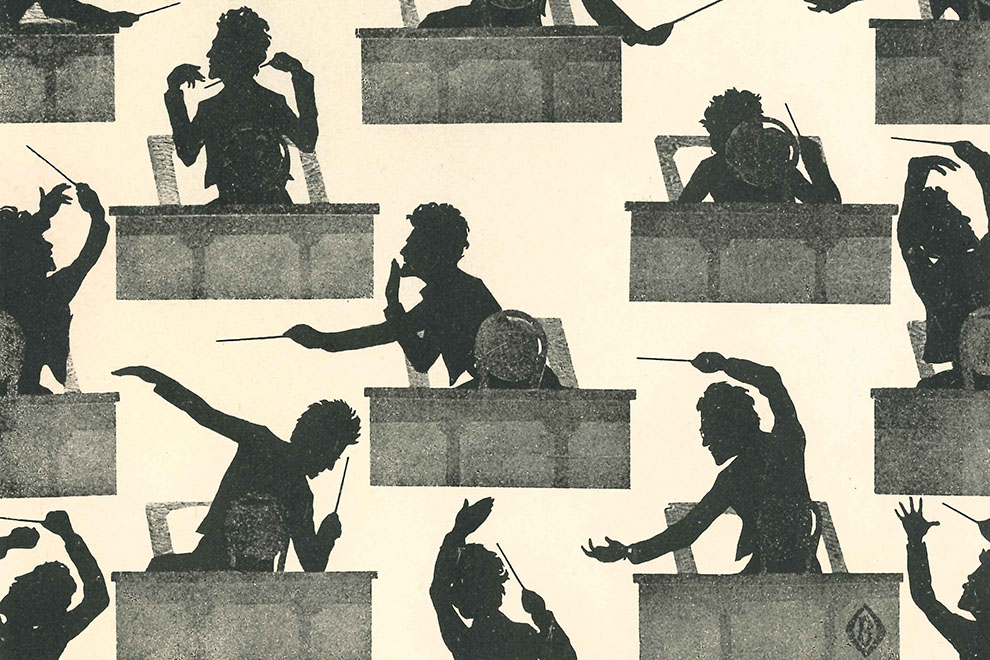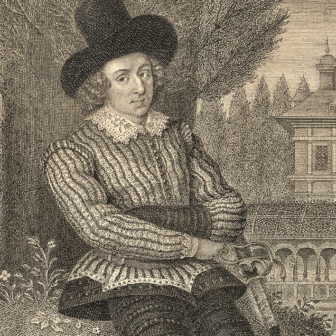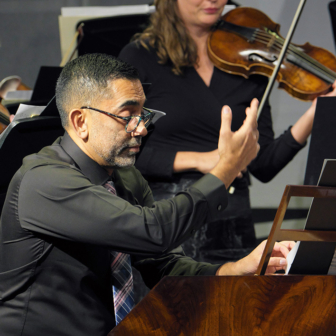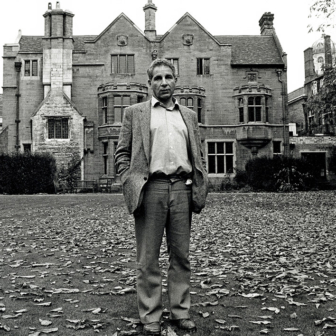A few years ago, and not for the first time, I dreamt a piece of music. Musical dreams seem to be quite common among composers. To take three big examples, Wagner dreamt the rippling E flat arpeggios at the opening of Das Rheingold; Stravinsky dreamt of a sacrificial virgin dancing herself to death, and went on to compose The Rite of Spring; Stockhausen dreamt his orchestral piece Trans, and set about realising it, right down to the tiered ranks of string players, the violet lighting and the noise of a gigantic weaver’s shuttle.
The strange thing about my dream was that the music was by someone else. I was in Carl Vine’s dream, finding myself present at the first performance of a piece by him sung by a large choir before a captivated audience in a darkened warehouse. I’d never heard anything like it. The music was full of beautiful sounds and I was especially taken with a refrain involving some mysterious chords.
Suddenly I was awake, the music still in my ears, so I dragged myself out of bed and jotted down as much as I could remember. As I dozed off again, I wondered vaguely about the propriety of stealing someone else’s music by this means.
As it turned out, I need not have worried. The following morning, I played over the beautiful refrain with its mysterious chords, only to find it was pretty substandard stuff. I was reminded of Phillip Adams’s contention that dreams are the bowel motions of the mind. I sent an email to Carl Vine, complaining that his latest music was frankly disappointing.
Dreaming good music is the ultimate in inspiration – a gift from the unconscious – but we only know about other people’s dreams when they tell us: Wagner, Stravinsky and Stockhausen clearly wanted us to know how they’d been inspired. In Stockhausen’s case, we might have worked it out for ourselves – it is hard to believe that Trans could have been the product of a fully rational mind – but we would have no reason to suppose that Wagner had dreamt the start of Das Rheingold. As it turns out, he probably didn’t.
In a wonderful and eminently readable new book, Lies and Epiphanies: Composers and Their Inspiration from Wagner to Berg, Chris Walton reminds us of Wagner’s account of lying on a sofa in La Spezia, semi-delirious as he recovered from dysentery. According to the composer, he was drifting into and out of consciousness when he first heard all that E flat. To say that the story suited this composer’s tendency to self-mythologise is to state the obvious; and shortly before he wrote his account, he had been reading Schopenhauer, who set great store by trance-like states. But in any case, the dates don’t add up. Wagner’s dream is just a good story, and the same is true, sad to relate, of the blinding flash that presented Mahler with the final, choral movement of his Resurrection symphony. The story served Mahler well in several respects.
The most surprising news from Walton’s book is that Berg’s Violin Concerto – the one dedicated “to the memory of an angel” – is unlikely to have been its composer’s response to the death of the teenage Manon Gropius. Berg had practically finished the work before she died. The Carinthian folk tune and the Bach chorale “Es ist genug” fit her tragic story well, but she couldn’t have inspired them.
None of which is to say that inspiration never happens, just that it isn’t always as poetic as we might like to believe. But why do we want it to be so? Is it that a good backstory chimes with an art form that is so often emotional? Does it help us feel we have understood the act of creation if we believe all music is about something – about more, that is, than the workings of a composer’s imagination?
Initial ideas for pieces of music can come from anywhere. Occasionally, it really does feel like a blinding flash. But once an idea for a piece has presented itself, hard work is the most efficient way of getting it written. Whoever it was who spoke of perspiration being 99 per cent of the creative process was correct. When that isn’t enough, a walk can do the trick. And the walk doesn’t have to take in mountain vistas – often just getting out of the house and going round the block can help you refocus. Sometimes it’s wise to call it quits for the day, because otherwise you’ll spend the following morning tearing up what you’ve done.
One of the artist’s most frequent sources of inspiration, let it never be forgotten, is the wherewithal to buy food. Mozart barely dipped his quill in ink unless he had the promise of a fee. In the epilogue to Walton’s book there is the story of Stravinsky in 1956 finding that the offer of $10,000 from Rolf Liebermann at North German Radio was not quite enough to inspire him to compose Threni, whereas $11,000 turned the music on. This is Liebermann’s version of the story. Stravinsky’s version involved another dream.
As Walton admits, the two stories are not mutually exclusive. Perhaps Stravinsky did dream some aspects of Threni; perhaps it was the dream that was inspired by the $11,000. Walton quotes the songwriter Sammy Cahn, composer of “Let It Snow! Let It Snow! Let It Snow!” Asked what came first, the words or the music, Cahn replied, “the telephone call.”
As for my email of complaint to Carl Vine, his reply was swift. He’d had his own dream the previous night, he informed me.
“I dreamt that I had given you the most extraordinary golden gift,” he said, “but when you got it home it had turned to clay.”
Sometimes inspiration can feel like that. •




